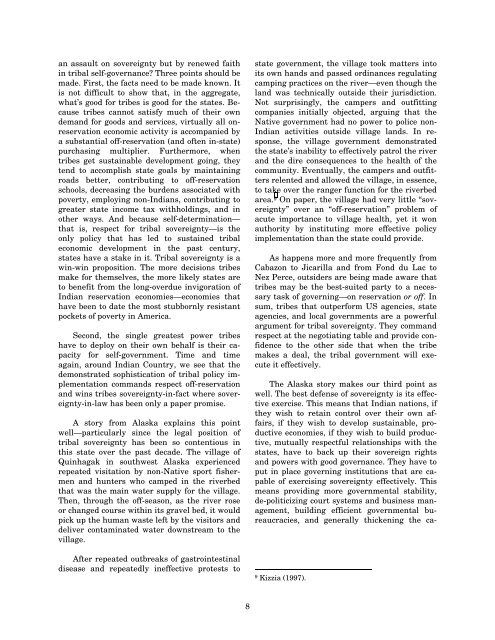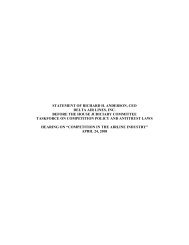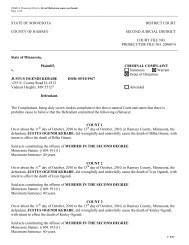Stephen Cornell and Jonathan Taylor - American Public Media
Stephen Cornell and Jonathan Taylor - American Public Media
Stephen Cornell and Jonathan Taylor - American Public Media
You also want an ePaper? Increase the reach of your titles
YUMPU automatically turns print PDFs into web optimized ePapers that Google loves.
an assault on sovereignty but by renewed faith<br />
in tribal self-governance? Three points should be<br />
made. First, the facts need to be made known. It<br />
is not difficult to show that, in the aggregate,<br />
what’s good for tribes is good for the states. Because<br />
tribes cannot satisfy much of their own<br />
dem<strong>and</strong> for goods <strong>and</strong> services, virtually all onreservation<br />
economic activity is accompanied by<br />
a substantial off-reservation (<strong>and</strong> often in-state)<br />
purchasing multiplier. Furthermore, when<br />
tribes get sustainable development going, they<br />
tend to accomplish state goals by maintaining<br />
roads better, contributing to off-reservation<br />
schools, decreasing the burdens associated with<br />
poverty, employing non-Indians, contributing to<br />
greater state income tax withholdings, <strong>and</strong> in<br />
other ways. And because self-determination—<br />
that is, respect for tribal sovereignty—is the<br />
only policy that has led to sustained tribal<br />
economic development in the past century,<br />
states have a stake in it. Tribal sovereignty is a<br />
win-win proposition. The more decisions tribes<br />
make for themselves, the more likely states are<br />
to benefit from the long-overdue invigoration of<br />
Indian reservation economies—economies that<br />
have been to date the most stubbornly resistant<br />
pockets of poverty in America.<br />
Second, the single greatest power tribes<br />
have to deploy on their own behalf is their capacity<br />
for self-government. Time <strong>and</strong> time<br />
again, around Indian Country, we see that the<br />
demonstrated sophistication of tribal policy implementation<br />
comm<strong>and</strong>s respect off-reservation<br />
<strong>and</strong> wins tribes sovereignty-in-fact where sovereignty-in-law<br />
has been only a paper promise.<br />
A story from Alaska explains this point<br />
well—particularly since the legal position of<br />
tribal sovereignty has been so contentious in<br />
this state over the past decade. The village of<br />
Quinhagak in southwest Alaska experienced<br />
repeated visitation by non-Native sport fishermen<br />
<strong>and</strong> hunters who camped in the riverbed<br />
that was the main water supply for the village.<br />
Then, through the off-season, as the river rose<br />
or changed course within its gravel bed, it would<br />
pick up the human waste left by the visitors <strong>and</strong><br />
deliver contaminated water downstream to the<br />
village.<br />
After repeated outbreaks of gastrointestinal<br />
disease <strong>and</strong> repeatedly ineffective protests to<br />
8<br />
state government, the village took matters into<br />
its own h<strong>and</strong>s <strong>and</strong> passed ordinances regulating<br />
camping practices on the river—even though the<br />
l<strong>and</strong> was technically outside their jurisdiction.<br />
Not surprisingly, the campers <strong>and</strong> outfitting<br />
companies initially objected, arguing that the<br />
Native government had no power to police non-<br />
Indian activities outside village l<strong>and</strong>s. In response,<br />
the village government demonstrated<br />
the state’s inability to effectively patrol the river<br />
<strong>and</strong> the dire consequences to the health of the<br />
community. Eventually, the campers <strong>and</strong> outfitters<br />
relented <strong>and</strong> allowed the village, in essence,<br />
to take over the ranger function for the riverbed<br />
area. 9 On paper, the village had very little “sovereignty”<br />
over an “off-reservation” problem of<br />
acute importance to village health, yet it won<br />
authority by instituting more effective policy<br />
implementation than the state could provide.<br />
As happens more <strong>and</strong> more frequently from<br />
Cabazon to Jicarilla <strong>and</strong> from Fond du Lac to<br />
Nez Perce, outsiders are being made aware that<br />
tribes may be the best-suited party to a necessary<br />
task of governing—on reservation or off. In<br />
sum, tribes that outperform US agencies, state<br />
agencies, <strong>and</strong> local governments are a powerful<br />
argument for tribal sovereignty. They comm<strong>and</strong><br />
respect at the negotiating table <strong>and</strong> provide confidence<br />
to the other side that when the tribe<br />
makes a deal, the tribal government will execute<br />
it effectively.<br />
The Alaska story makes our third point as<br />
well. The best defense of sovereignty is its effective<br />
exercise. This means that Indian nations, if<br />
they wish to retain control over their own affairs,<br />
if they wish to develop sustainable, productive<br />
economies, if they wish to build productive,<br />
mutually respectful relationships with the<br />
states, have to back up their sovereign rights<br />
<strong>and</strong> powers with good governance. They have to<br />
put in place governing institutions that are capable<br />
of exercising sovereignty effectively. This<br />
means providing more governmental stability,<br />
de-politicizing court systems <strong>and</strong> business management,<br />
building efficient governmental bureaucracies,<br />
<strong>and</strong> generally thickening the ca-<br />
9 Kizzia (1997).
















